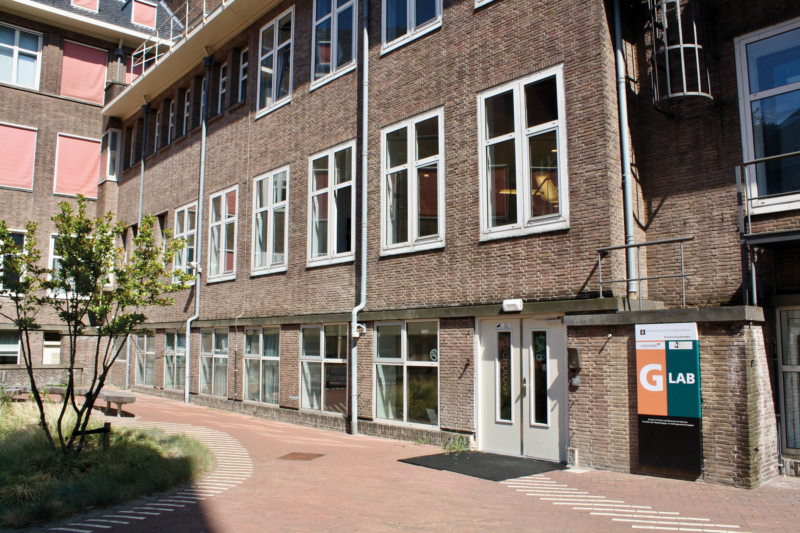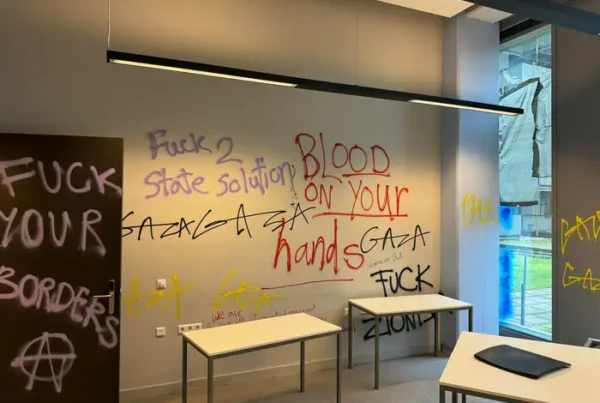

When I started my bachelor’s in Psychology at the UvA in 2017/2018, I did not know I belonged to the last batch of students that started (and could theoretically finish) their bachelor’s in Dutch. As my first two years proceeded, more and more lecture slides were translated from Dutch to English, because the professors were already preparing for the years to come. The new batch of first- and second year students would be the first students the professors had to teach in English instead of Dutch and some professors made it noticeably clear that they were not happy about this transition imposed on them.
Initially, so far I was glad I could still finish my bachelor’s in Dutch. However, in my third year in 2019/2020, I decided to drop out for a while, because I realized I choose the wrong specialisation and was struggling with some personal issues at the time. When I got back to university in 2020/2021 to finish my bachelor’s, the programme was suddenly in English. Although I started off a bit nervous about this language transition, in the end I think studying in English really helped me improve my language skills and prepared me for the international environment in which I am now doing my (fully English) master’s degree.
I myself was happy that I could still choose to take all my tutorials in Dutch, which was especially helpful in the therapy-related courses I took as I specialized in Clinical Psychology. This is because if I decide to become a clinical psychologist later, I want to be a Dutch one in The Netherlands. Therefore, it only makes sense to also practice my therapy skills in Dutch. However, we did not have this language choice for the lectures. It was weird to hear about the Dutch mental health care system in English-taught lectures. Some terms are just hard to translate, and I think I would have a better understanding of the mental health care system in my own country if I could have finished my bachelor’s in Clinical Psychology in Dutch, since there would likely be a deeper focus on the Dutch mental health care system. What furthermore struck me in the English programme was that I still felt advantaged by being a Dutch student at a Dutch university. A lot of the examples that were used in the therapy-related courses were in Dutch, sometimes even without subtitles because ‘it were mainly the visuals that taught you’. Dutch idioms were also often used, expressions that, even if their translations are given, can just not be grasped by a foreigner.
So far about my experiences, compared to some of my friends that also started with the bachelor’s in 2017/2018 I was not that much disadvantaged. One of my dear friends went abroad to Norway in the spring semester of 2020. Unfortunately she had to come back to The Netherlands when covid hit, but this was not the only difficult adjustment she had to make. She had already taken half of the courses of her specialisation Clinical Neuropsychology in the fall semester of 2019. Finishing her bachelor’s in 2020/2021, with a changed programme, courses that were merged together or that had suddenly disappeared and some courses transitioning to English-taught (in the specialisation Clinical Neuropsychology many courses did remain Dutch-taught), it was quite a challenge to collect all her credits. Of two courses in 2020/2021 she had to take half, because the other half of the content she had already taken the year before, when the courses were in a different format. Moreover, another course that was part of the Clinical Neuropsychology specialization in 2019/2020 had suddenly disappeared in 2020/2021. She had to fill up the credits of this course with a random elective, which was eventually quite boring for her as it consisted of many things she had already learned in her previous three years of studying psychology.
None of us knew when we started in 2017/2018 that for us, it would be more disadvantageous to extend our bachelor’s than the batches of students in the years before and after us. If I had directly chosen the right specialisation, I think I would have had quite different experiences with and knowledge of therapy and mental health care in The Netherlands. Eventually, we have all successfully finished our degree, but some planning struggles could not be avoided. I think the UvA could have thought about this more before switching the programme, so that students who decided to extend their bachelor’s for whatever reason could still have finished their degree the way they were always told so, and in their own language.

When I started my bachelor’s in Psychology at the UvA in 2017/2018, I did not know I belonged to the last batch of students that started (and could theoretically finish) their bachelor’s in Dutch. As my first two years proceeded, more and more lecture slides were translated from Dutch to English, because the professors were already preparing for the years to come. The new batch of first- and second year students would be the first students the professors had to teach in English instead of Dutch and some professors made it noticeably clear that they were not happy about this transition imposed on them.
Initially, so far I was glad I could still finish my bachelor’s in Dutch. However, in my third year in 2019/2020, I decided to drop out for a while, because I realized I choose the wrong specialisation and was struggling with some personal issues at the time. When I got back to university in 2020/2021 to finish my bachelor’s, the programme was suddenly in English. Although I started off a bit nervous about this language transition, in the end I think studying in English really helped me improve my language skills and prepared me for the international environment in which I am now doing my (fully English) master’s degree.
I myself was happy that I could still choose to take all my tutorials in Dutch, which was especially helpful in the therapy-related courses I took as I specialized in Clinical Psychology. This is because if I decide to become a clinical psychologist later, I want to be a Dutch one in The Netherlands. Therefore, it only makes sense to also practice my therapy skills in Dutch. However, we did not have this language choice for the lectures. It was weird to hear about the Dutch mental health care system in English-taught lectures. Some terms are just hard to translate, and I think I would have a better understanding of the mental health care system in my own country if I could have finished my bachelor’s in Clinical Psychology in Dutch, since there would likely be a deeper focus on the Dutch mental health care system. What furthermore struck me in the English programme was that I still felt advantaged by being a Dutch student at a Dutch university. A lot of the examples that were used in the therapy-related courses were in Dutch, sometimes even without subtitles because ‘it were mainly the visuals that taught you’. Dutch idioms were also often used, expressions that, even if their translations are given, can just not be grasped by a foreigner.
So far about my experiences, compared to some of my friends that also started with the bachelor’s in 2017/2018 I was not that much disadvantaged. One of my dear friends went abroad to Norway in the spring semester of 2020. Unfortunately she had to come back to The Netherlands when covid hit, but this was not the only difficult adjustment she had to make. She had already taken half of the courses of her specialisation Clinical Neuropsychology in the fall semester of 2019. Finishing her bachelor’s in 2020/2021, with a changed programme, courses that were merged together or that had suddenly disappeared and some courses transitioning to English-taught (in the specialisation Clinical Neuropsychology many courses did remain Dutch-taught), it was quite a challenge to collect all her credits. Of two courses in 2020/2021 she had to take half, because the other half of the content she had already taken the year before, when the courses were in a different format. Moreover, another course that was part of the Clinical Neuropsychology specialization in 2019/2020 had suddenly disappeared in 2020/2021. She had to fill up the credits of this course with a random elective, which was eventually quite boring for her as it consisted of many things she had already learned in her previous three years of studying psychology.
None of us knew when we started in 2017/2018 that for us, it would be more disadvantageous to extend our bachelor’s than the batches of students in the years before and after us. If I had directly chosen the right specialisation, I think I would have had quite different experiences with and knowledge of therapy and mental health care in The Netherlands. Eventually, we have all successfully finished our degree, but some planning struggles could not be avoided. I think the UvA could have thought about this more before switching the programme, so that students who decided to extend their bachelor’s for whatever reason could still have finished their degree the way they were always told so, and in their own language.



